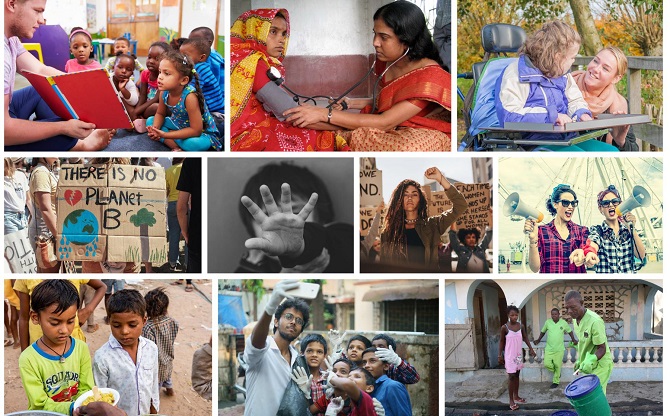World NGO Day is an opportunity to recognise the many remarkable voluntary workers in non-governmental organisations who help other people and societies worlwide, creating positive change and bringing hope.
Has anyone ever stopped to think how the world would be without civil society organisations? It is indeed difficult to imagine as it is in the peoples’ DNA to represent each other and to ensure people are protected all over the world… people with their inherent human rights and dignity.
Countless human NGOs have been incredibly effective to give a voice to those who suffer from repression and challenge injustice, oppression and brutality in many parts of the world. Yet, we are witnessing an unprecedented crackdown on civil society in many countries. Measures against NGOs include restrictive legislation on foreign funding, restrictions for registration or association of civil society organisations, anti-protest laws, gagging laws, laws that criminalise online dissent and expression, the blocking of access to websites and social media and, in some cases, violent attacks and harassment.
“This trend has to stop,” EU High Representative Joseph Borrell stressed in a statement to mark NGO Day. Borrell declared that “The EU is committed to the protection and empowerment of civic actors, including human rights defenders, and to the promotion of space for civil society. We will continue to meet with human rights defenders, monitor their trials, visit them in detention, and raise their cases with governments. The EU also supports key international actors, such as UN Special Rapporteurs on human rights defenders, freedom of association, and freedom of expression.”
Read also
EU meets Human Rights Defenders
When the Universal Declaration of Human Rights commemorated its 70th anniversary, the EU held a video campaign giving a voice to Human Rights Defenders also working with NGOs, people who believe in equality, justice and a voice for all, actively involved in protecting and defending human rights.
These are the stories of some of the people we had spoken to:
Haykuhi’s story – Armenia
Haykuhi Harutyunyan works for the Protection of Human Rights without Borders(link is external) NGO in Armenia. “Since 2003 I have been involved in advocacy. During these years I have never thought of protecting Human Rights per se. Instead I have thought of how I can help people, and the protection of human rights is the best answer to that question.” Haykuhi was the driving force behind the victory of the case of Andrias Ghukasyan who was persecuted for his political views.
“Don’t think you can’t change anything. Be the change and stand up for human rights,” Haykuhi states.
Godfrey’s story – Zambia
Godfrey Malembeka a former prisoner, founded the NGO for Prisons Care and Counselling Association (PRISCCA)(link is external). Godfrey recalls his experience: “When I saw the treatment for suspects and prisoners, when I saw the congestion levels in our correctional facilities, I thought there must be something we need to do to make the lives of those incarcerated people and the children that we found inside better, or at least make the environment more humane.” He explains that the purpose of his NGO is for “defending, promoting and protecting prisoners and suspects in Zambia.”
Godfrey stresses that, “No one shall be subjected to torture, cruel, inhumane treatment in this era.”
Sarah’s story – Australia
“For me human rights has always been about equality,” states Australian Human Rights Defender at Refugee Advice and Casework Service (RACS), Sarah Dale. “Why just because I was lucky enough to be born in Sydney should my experience and my opportunity be so vastly different from someone who grew up in a different country?” she asks.
Sarah believes that “What I am able to access, what I am able to achieve should be equal to another person.”
EU, world’s largest donor to civil society
The European Instrument for Democracy and Human rights (EIDHR) is one of the largest EU instruments dedicated to supporting civil society, with €1.5 billion proposed for 2021-2027. This instrument facilitates direct cooperation with isolated or marginalised civil society actors, including the allocation of direct grants to those operating in particularly difficult human rights and democracy contexts. Since 2005, the EU has supported more than 30, 000 human rights defenders.
EU Aid Volunteers
EU Aid Volunteers brings together volunteers and organisations from different countries, providing practical support to humanitarian aid projects. It gives European citizens a chance to show their solidarity by collaborating in humanitarian projects worldwide.
Some volunteers in Colombia share their experience:
The EU considers civil society organisations as key partners for the successful implementation of the 2030 Agenda for Sustainable Development(link is external). States can only be resilient and enjoy sustainable security when human rights are protected and civil society is able to operate in a safe and enabling environment. On World NGO Day and every day, the EU stands up for a strong and pluralistic civil society. It will continue to promote a safe and enabling environment in which civil society can operate free from hindrance and insecurity.
European Union

























































